Ferrari Purosangue review: More raised coupe than true SUV
With generous ground clearance and an extra pair of doors, the Purosangue is the perfect Ferrari for India.
Published on Mar 10, 2023 05:10:00 PM
41,117 Views
Follow us on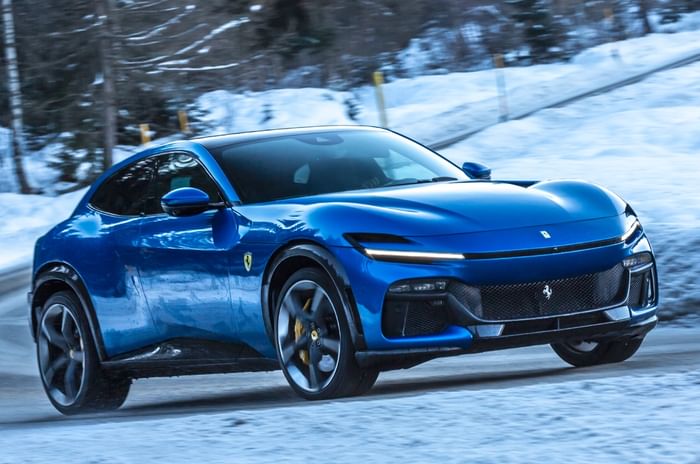
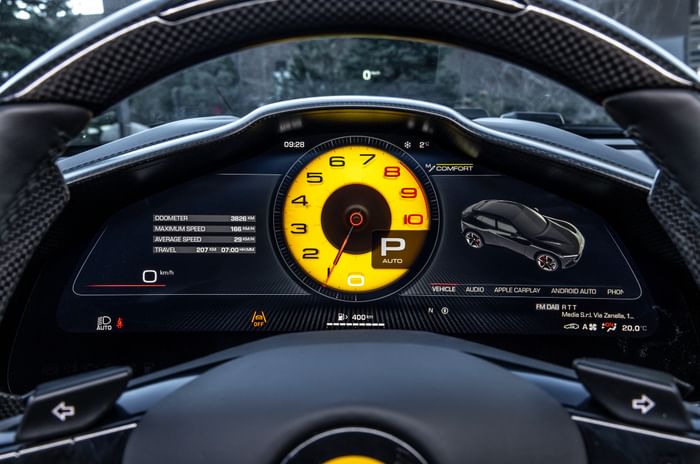
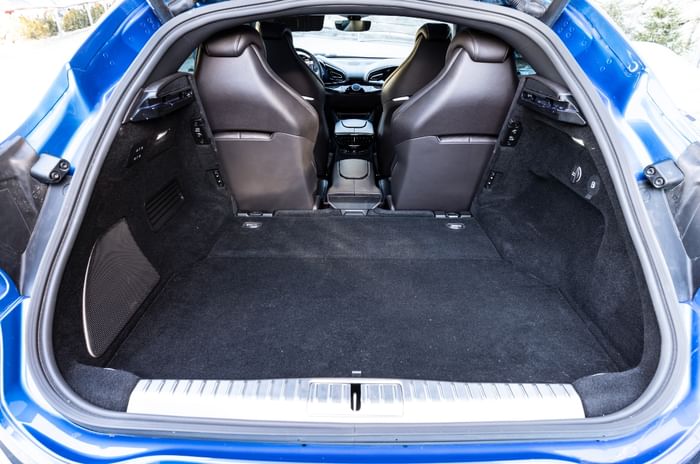
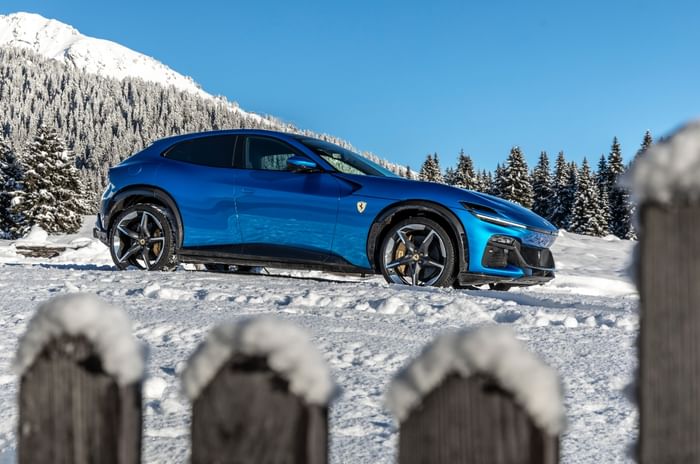
Say hello to the all-new Purosangue (pu-roh-sang-way), a tongue twister of a name that means thoroughbred in Italian. And true to its name and pedigree, Ferrari has kept the fundamentals of this hallowed brand completely intact, despite breaking a few traditions. It’s the first four-door Ferrari in history and comes with SUV-like ground clearance. But calling the Purosangue an SUV is blasphemous (for Ferrari) and you can understand why. It’s a radical departure from the SUV template followed by rivals like Lamborghini, Porsche and Aston Martin and more of a high-riding sportscar.
.jpg?w=700&c=0)
Though it’s unlike any Ferrari yet, the Purosangue is still a Ferrari through and through with its long bonnet, voluptuous curves and tightly skinned body wrapped around massive 22-inch wheels in front and 23 inchers at the back. The Roma-inspired styling keeps the essence of a front-engine Ferrari, though some details such as the slot-like front grille and the rear suicide doors are quite unique. Overall, the Purosangue is a stunning-looking car, with perfect proportions and is aggressive and elegant in equal measure.
At the heart of the Purosangue is nothing less than a V12, the same 6.5 litre that powers the 812 Superfast but with mildly less power (715hp). The 4x4 drivetrain is derived from the FF/GTC4 with an eight-speed, twin-clutch gearbox mounted at the rear and a separate two-speed ‘Power Control Unit’ that drives the front pair of half-shafts, each with a clutch of their own. This complex piece of engineering provides a four-wheel drive when you need it, depending on the mode you’ve selected and how much grip there is.
| Ferrari Purosangue Price, Mileage, Specifications, Features and Variants | |
|---|---|
| Brand | Ferrari |
| Model Name | Purosangue |
| Ferrari Purosangue Price | ₹ 12.12 crore |
| Ferrari Purosangue Range/Mileage | NA |
| Ferrari Purosangue Specifications | SUV | 5 doors | 4 seats View All Specs |
| Ferrari Purosangue Features | LED headlight | 10.2-inch Touchscreen display | 10 airbags View All Features |
| Ferrari Purosangue Variants | 6.5 Petrol V12 View All Variants |
A mix of high-tensile steel, aluminium, carbon fibre and other lightweight materials has kept the weight in check – the Purosangue weighs 2,033kg, which, for a four-door, four-wheel-drive supercar, isn’t very heavy. Weight distribution is perfectly optimised for a 49:51 front-rear balance.
Ferrari Purosangue dimensions and design
Ferrari may have stepped out of its comfort zone by jacking up the ride height and adding an extra pair of doors, but this has unwittingly made the Purosangue the perfect Ferrari for India. Let’s start with the 185mm ground clearance, possibly the most important detail on the spec sheet for Indian buyers. Add an extra 20mm, and you get the standard lift system, or 30mm with the optional Lift Plus, and you’re looking at an SUV-like 205-215mm gap between the road and the long underbelly. Speed breakers, shorn of road edges that you would have to tip-toe over in a Roma, can be crested without having to clench your teeth in anticipation of a sickening crunch. This makes the Purosangue an everywhere car and not just one for carefully curated drives on hard-to-find smooth roads.
.jpg?w=700&c=0) All-wheel drive and 185mm ground clearance give some degree of off-road ability.
All-wheel drive and 185mm ground clearance give some degree of off-road ability. Having four doors considerably also widens the appeal of the Purosangue in India where practicality, comfort and space are advantages even at the sharp end of the super sportscar market, where a chauffeur-driven Ferrari wouldn’t be something inconceivable. Over 70 percent of Porsches sold in India are four doors and the Urus accounts for over 80 percent of Lamborghini sales, most of them first-timers to the brand. Similarly, the Purosangue will appeal to a wide swathe of obscenely rich people who may have never thought of buying a Ferrari in the first place. Trouble is that if you don’t own a Ferrari already, you can’t buy a Purosangue as the first lot of orders are reserved for only existing Ferrari owners.
Designing a four-door sportscar may seem straightforward but not when you turn things on their head and go for rear-hinged suicide doors. Maintaining the Purosangue’s length profile and proportions was non-negotiable and the only way to achieve that was with a rear-hinge design. The other benefit is easy access into the cabin via a rear door that pivots from the C-pillar and swings open by 90 degrees. The massive wheel arch meant that there was no place for two hinges and the entire rear door had to be supported by a single hinge, which was an engineering nightmare.
Ferrari Purosangue interior and features
Getting in and out of the rear seat is incredibly easy and so is the opening and closing of the door, which operates electronically, with just the press of a button on the inside B-pillar, just like in a Rolls or a Maybach. The seats themselves adjust electronically for length and recline, which makes you wonder if this is a sportscar or a luxury limo. That question is answered when you plonk yourself in the seat. Though legroom and headroom are both good, the seat itself is a bit too firm, especially in the lower back area.
The contoured seats hold you nicely when the Purosangue is being driven like a Ferrari, but for everyday use, the rear two buckets don’t quite cosset you and aren’t the most comfortable. Also, the Purosangue is strictly a four-seater with no scope for a middle passenger, and the boot is a decent but not great 473 litres.
.jpg?w=700&c=0)
The place to be in any Ferrari is the driver’s seat and the Purosangue’s cockpit is certainly the business. You are surrounded by high-quality materials that are on par with the insides of a Lambo or a Porsche. From the elevated driving position, forward visibility is good and you can see well beyond the long bonnet which drops away. That can’t be said of the rear view, which is pretty limited through the small window. And there’s no rear wiper. Ferrari says you don’t need one as the air flow is angled to blow water and grime away, but we are not sure how effective it would be in grimy monsoon conditions.
The chunky flat-bottomed steering wheel is great to grip but is overloaded with too many controls, including the turn indicators, and this can be a bit overwhelming. There are no buttons but only capacitive touchpads on either side of the wheel and even the engine start button is touch-sensitive instead of a proper button. This takes away a bit of the charm of firing the V12.
.jpg?w=700&c=0)
Ferrari has given indents in the touchpads for you to feel, like Braille, so you don’t have to take your eyes off the road to operate the controls. It’s still not the most intuitive experience because the touchpads are fiddly and don’t respond consistently with every swipe and tap.
The instrument cluster is fully digital with a configurable screen and by swiping the right-hand-side pad, you can switch between a navigation screen and the instrument panel that has a large rev counter in the centre. The Purosangue doesn’t come with in-built navigation – Ferrari has conceded that there’s nothing to beat Google Maps that can be mirrored easily on to the screen via your phone. The passenger has a dedicated screen to select music or flick through some of the driving stats like revs and speed.
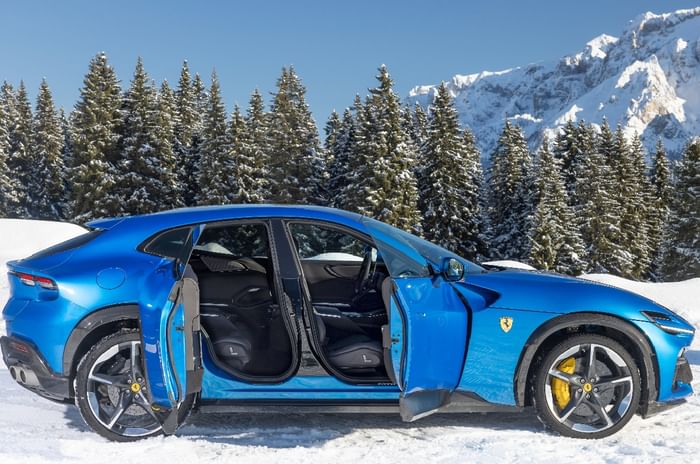 Rear-hinged doors are unique and make getting in and out of the rear seat easy.
Rear-hinged doors are unique and make getting in and out of the rear seat easy.Between the driver and passenger screens is a rotary controller for the aircon, which rises out of the dash when you tap it. It adds a bit of drama to the cockpit, but again, is not intuitive to use as you have to tap it again to select a function and then twirl the rotary knob. The overall UI/UX of the controls aren’t well-thought-out and needs improvement for sure.
Ferrari Purosangue performance and handling
All these foibles melt away when you fire the V12, which is an aural delight. It’s pretty muted at low revs and Ferrari says it’s their quietest engine, the result of a fair bit of sound deadening all around to give the all-weather Purosangue strong GT credentials. In fact, a short run on the autoroute immediately established the Purosangue as a brilliant cruiser and I could imagine it gobbling up Indian highways without the worry of scraping the underbelly or expensive carbon-fibre chin.
.jpg?w=700&c=0) Purosangue looks like a raised coupe but has SUV cues like a rear skid plate.
Purosangue looks like a raised coupe but has SUV cues like a rear skid plate.Though it rides on 22- and 23-inch rims, the ride is surprisingly good, especially with the damper setting on Soft. The best part is that ride comfort doesn’t suffer sharply when you choose the stiffer settings (Medium and Hard), which is a tribute to the sophisticated Multimatic True Active Spool Valve (TASV) suspension technology that uses small electric motors to rapidly adjust the dampers, depending on the road conditions.
There’s loads of grunt at low revs and all it takes is a hard prod of the throttle to transform this happy cruiser into a cruise missile. Manettino dialled to Sport, a few tugs of the long column-mounted left paddle, right foot pinned to the floor and the Purosangue rockets forward with all the drama and thrill only a V12 can deliver. The sound is spine-tingling. A deep roar crescendos to a high-pitched howl as the engine races to the 8,250rpm rev limiter lighting up all the blue LEDs on the steering wheel along the way. Supercar levels of acceleration mean you hit serious speeds in a flash and the claimed time of 0-100kph in 3.3s is entirely believable as is the top speed of 310kph.
The beauty of this naturally aspirated V12 is its flexibility, which gives you a wide rev band to play with. It’s an engine that loves to be wound hard and feels happiest at high revs. It’s also the last of a dying breed of great naturally aspirated V12s, which makes you want to cherish it even more.
.jpg?w=700&c=0)
The Dolomites in early March are still covered in snow and that’s the cue to begin my ice-breaking session with the Purosangue in, well, Ice mode. There are five drive modes selectable by the familiar Manettino, which is also the only hard button on the steering wheel. You can also play around independently with the damper settings and the set-up. I finally settle on Sport Mode with the suspension at its softest setting.
Ferrari Purosangue expected price and verdict
The Purosangue is a big car and it takes a few kilometres on narrow and icy Italian mountain roads to adjust to its size and power. But in no time I find myself digging hard into the Purosangue’s dynamics, revelling in the car’s spot-on balance and rear-wheel-drive adjustability. A hard jab of the throttle pedal in Sport Mode neatly brings the tail out in a burst of controlled oversteer. The way you can pivot the Purosangue around tight hairpins and tight corners makes you feel like a hero and you actually forget that this is a high-riding 2-tonne car.
.jpg?w=700&c=0) Purosangue will account for only 20 percent of total Ferrari production, which means a never-ending waiting list.
Purosangue will account for only 20 percent of total Ferrari production, which means a never-ending waiting list.Like the power delivery, the steering feel is also more linear and not as quick off-centre as other Ferraris, which gives the Purosangue a predictability that drivers will appreciate. In fact, it’s the usability, the more measured character of the Purosangue, which isn’t as high-strung as some of Ferrari’s hard-core sportscars that owners and their families will deeply appreciate. Yet, it has all the essence of a Ferrari and isn’t short on thrills.
And it’s not short on price either. With all taxes and duties paid, you’re looking at a price north of Rs 7 crore and that’s if you get an allotment for one. Worth it? There’s never been a Ferrari like this. Comfortable, spacious and suited to Indian roads. If anything, buy it just for that fabulous 6.5-litre V12 to savour internal combustion at its best.
Tech Specs 
Copyright (c) Autocar India. All rights reserved.


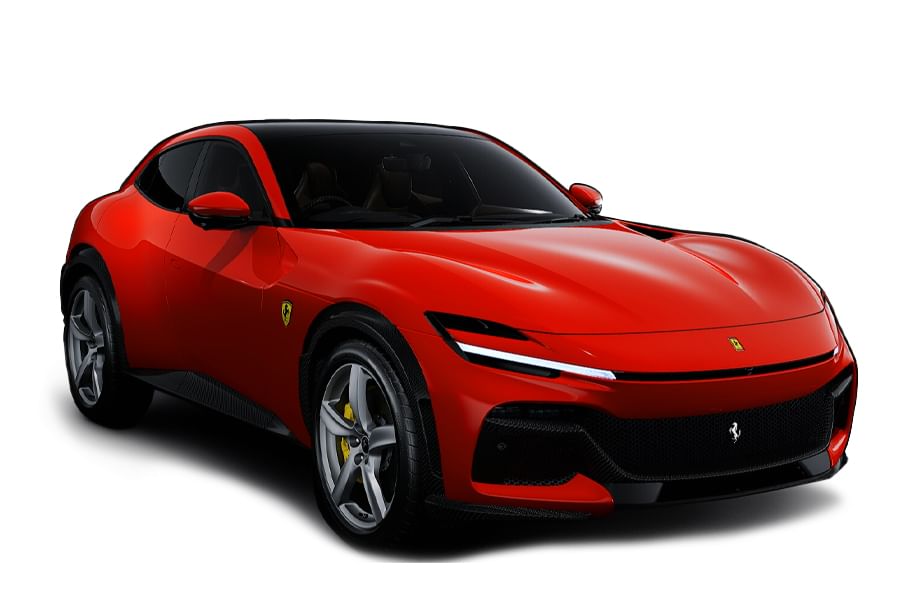



 Engine
Engine Transmission
Transmission Acceleration
Acceleration Body
Body Brakes
Brakes Dimensions
Dimensions
Comments
Member Login
Personal Details
No comments yet. Be the first to comment.